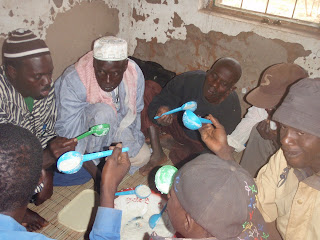

The Gambian women planted their rice crops last July and with good rains they have grown very well. It is now harvest time and the women are working very hard to collect the rice for consumption. I was keen to be part of the harvest process with my Gambian friend's wife, sisters and extended family who live in a village called Sanqwia. I have met these women on a number of occasions and knew they would look after me and show me what to do.
I met them at the rice fields, following a teacher workshop I assisted with in the morning. The rice fields are close to the Gambian river, which is about 2-3km away from their homes. We then walked through mud and water up to our thighs and weaved through harvested crops to our destination. Ladies were carrying buckets on their head holding food, drink and utensils for the day.
The rice crops we were harvesting belonged to a village mid wife who freely assists ladies of the village with baby deliveries. As a thankyou for her services the village women help her with planting and harvesting. On arrival, already covered in mud, we had sour milk, sugar and dry cous cous, which has the same texture, colour and consistency as sand. I've eaten it a lot in local villages and have grown to like the taste. We got out our knives, I used my swiss army knife, arranged the 30 of us in a line and began to cut the rice, cutting the rice head and a 15cm stem. The outer stem also needed to be removed to cut down on work when it is at the pounding stage.
With my knife, I began to look for rice heads and with one hand slice the stem, remove excess growth and bundle it in my left hand. We moved forward together, ladies supporting each other to ensure all rice heads were harvested. During the harvest, the ladies sang songs together in a harmonic rhythm, I was spellbound. One lady begins and proceeds to sing a song of thanks for each of the women working, they respond with 'Abaracka, abaracka” which means thankyou. They were excited that i was helping and my Gambian name 'Aja Jawneh' was used in their song many times, I responded with 'Abaracka, abaracka'. Other songs were about Soma and their village Sanqwia.
Being out there with the ladies was truly a magical moment for me. Surrounded by huge rice fields, blue skies, palm trees, working alongside colourful dressed ladies singing in unison as they harvested rice. I really felt part of the team and was treated as such. Further afield, women in groups were also busy singing and harvesting.
The ladies look after each other, always sharing and working together. One lady walks along with a tray of cordial like drinks, whilst another shares more sour milk and cous. The rice harvested is bundled, transported to the edge of the rice fields and covered by plastic for collection. When the women have enough harvested, a donkey cart managed by children, comes along and transports the rice to the village compound. Here the rice is pounded with a large millet (like a mortar and pestle) to firstly remove the rice heads. The rice heads are then pounded to remove the outer shell. The rice is then ready to eat.
The following day when I went to visit Sanqwia and the ladies greeted me, making actions with their arms of cutting rice. Despite the language barrier, I have a strong connection with these women. Our hearts are in the right place. I look forward to a whole day in the rice fields with the ladies next weekend, 'Enshallah'. (god willing).



